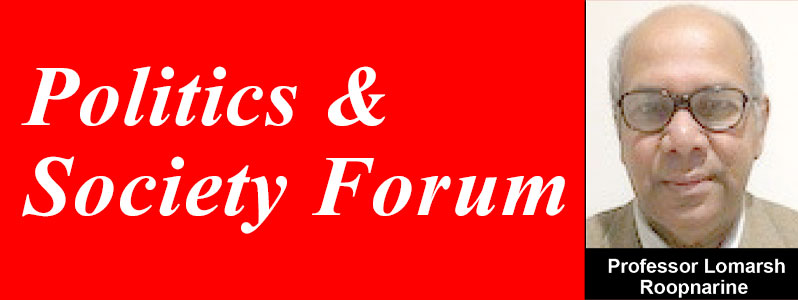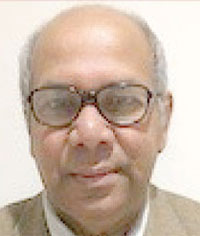IF I were to ask someone who has been living in Guyana for a long time, who are you, the response would sound like this: “I am a Guyanese.” If I were to ask the same question to the same person during the political purgatory period from March 2 to July 31, 2020, the response would most likely be, “I am an African Guyanese supporter of the APNU+AFC Coalition, or I am an Indian Guyanese supporter of the PPP/C.” When the two responses are combined, we have what is called ethno-politicization of identities. Even if this is not the case, let us assume it is, for the sake of a probable argument.
In a nutshell, ethno-political identity is a socially constructed process where (a) people distinguish themselves from others through a common language, territory, culture, and descent, and when (b) this ethnic identification is politicized in relevant ways to achieve some objectives. Ethno-political identities in Guyana are a historic product of various isms: imperialism, colonialism, and capitalism. The forceful and semi-free importation of Africans, Indians, Chinese, Portuguese, and others by European colonizers to achieve economic goals was singlehandedly responsible for the creation of multi-cultural identities in British Guiana. When formed, each imported ethnic group held on to its own identity but cohere in “cooperation and competition” rather than in conflict, amid some cultural tensions among themselves. I am thinking here of the “Angel Gabriel” Riots of 1856 and racial disturbances in the early 1960s. The jostling and jockeying for power on an individual or collective group level based on identity was sporadic because of the superstructure of the colonial system. Guyana’s multi-cultural identities found some level of autonomy in the way of expressing civic identity, including identification with the colonial system, sometimes superciliously and superficially. Over time, a pan-Guyanese identity from the multi-cultural ethnic groups was formed and used to decolonize Guyana.
At independence in 1966, Guyana inherited an ethnic morphology with three dominant features. First, Africans and Indians comprised the dominant groups. Second, there were minor cultural differences among various groups, although ancestral customs of many ethnic groups were not eradicated by colonialism. The Guyana identity superseded individual ethnic identity. Third, the ethnic geographical residency was noticeable. Africans lived in urban areas while Indians lived in the countryside. These features were unique to Guyana. They were not common in many countries of the developing world that emerged from three centuries of colonialism. Some developing countries have been homogeneous (Haiti), unipolar with one dominant group (Nicaragua) multipolar but divided by one single dimension with no dominant group (sub-Saharan Africa), multicultural but divided by more than one dimension of differentiation (India), according to James Scarritt and Johnanna Birnir (2017).
Guyana, however, is a bipolar, deeply divided country by race and ethnicity. This division was socially constructed and remained dormant by the forces of colonialism until the PPP party split in the 1950s. Since then, Africans and Indians have been politicalized by the PNC now APNU+AFC Coalition and PPP/C parties to gain access to power through pork-barrel techniques. The activation of the pork barrel techniques – pleasing voters by giving them incentives as opposed to policies– brought to the surface the “hidden” layer of conflict to the existing ethno-political identity of “cooperation and competition” during colonialism.
Contrary to common beliefs, ethno-political feelings are in concert more with cooperation and competition rather than with conflict. On an international level, only a small percentage of ethnic groups engage in conflicts, and when they do happen, they are often distorted by the media and individuals who have an axe to grind. Apart from outright conflicts, we are not sure if interactions among ethnic groups are a consequence of institutionalised competition or organized conflicts because the boundaries are often blurred. More often ethnic groups start their interaction with cooperation before engaging in conflicts. At a national level, as in Guyana, ethno-political conflicts are generally sporadic during the electoral cycle of every five years. The reason for this situation is that Guyana is a divided society and mutual fears and distrust that exist daily are brought to the fore around general elections because of the winner takes all political system. Prior to general elections, ethnic differences are magnified by extreme thoughts and fake news that the loser at the polls will become victim of politicide: the politics of exclusion, or the exclusion from politics.
From all indications, ethno-political identities are socially constructed and activated because they are beneficial to those who rely on and practise them. This is not all bad. Take for example, if we do not have ethno-political identities, then what is the alternative? We certainly do not want one dominant group in Guyana. The activation of ethno-political identities works well when it is used to avoid communal contention, and that is, to desist from exaggerating cultural differences, encourage interaction so that ethnic groups have equal access to state resources, and value areas of mutual understanding and cooperation. The position of Guyana’s ethnic groups that Essequibo belongs to Guyana in the Guyana-Venezuela border controversy, not dispute, is a prime example of how ethno-politicization of identity can be beneficial (lomarsh.roopnarine@jsums.edu).




.png)









